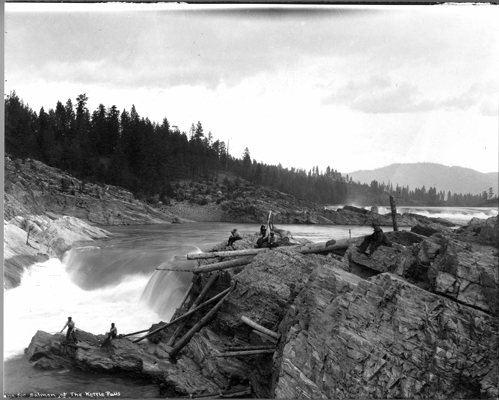Treasures of the Archives: The Loss of Kettle Falls

When the gates of the newly constructed Grand Coulee Dam closed in 1939, the waters of the mighty Columbia River began to back up behind the dam. As the waters rose, farms, historic sites, and ten small agricultural towns were lost to the rising floodwaters forming behind the colossal dam.
Perhaps the most important site lost was Kettle Falls. Shaped by enormous quartzite blocks, the impressive falls were an important part of regional native culture. As spawning salmon migrated up the Columbia River to their summer breeding grounds, they would leap up the falls. For thousands of years American Indians from all over the region travelled to Kettle Falls to fish and engage in trade and social reunions. Thousands of fish could be caught in a single day by the many Indians who shored the fishing camps beside Kettle Falls.
The falls were last seen in 1940 as the rising waters of Lake Roosevelt soon inundated the site. Not only were the falls lost beneath the waves, the dam permanently blocked the migration of salmon into the Upper Columbia, ending an important aspect of native cultural life. The Confederated Tribes of the Colville Reservation hosted a three-day memorial event in June, 1940 known as the “Ceremony of Tears.” Today, the falls sits approximately 90 feet below the surface of Lake Roosevelt.
This photograph of Kettle Falls is one of many featured in our newly added Crossroads on the Columbia Photograph Collection. This collection was part of a Stevens County project funded through National Park Service Preserve America Grant, and features several interesting photograph collections from regional institutions in Stevens, Ferry, and Pend Oreille Counties. To learn more about the project, visit the Crossroads on the Columbia website.

